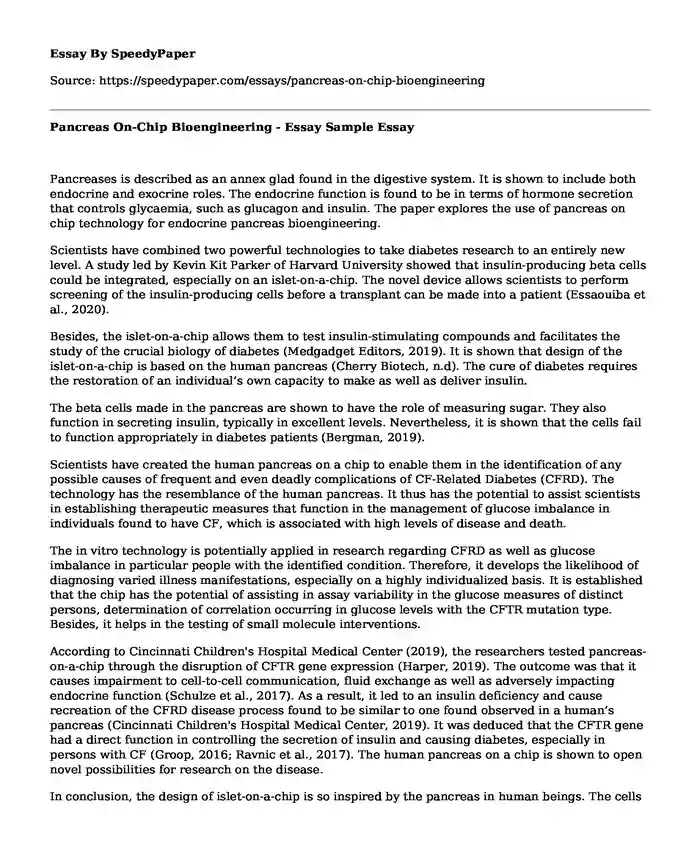
| Type of paper: | Essay |
| Categories: | Biology Medicine Genetics Science Healthcare |
| Pages: | 3 |
| Wordcount: | 779 words |
Pancreases is described as an annex glad found in the digestive system. It is shown to include both endocrine and exocrine roles. The endocrine function is found to be in terms of hormone secretion that controls glycaemia, such as glucagon and insulin. The paper explores the use of pancreas on chip technology for endocrine pancreas bioengineering.
Scientists have combined two powerful technologies to take diabetes research to an entirely new level. A study led by Kevin Kit Parker of Harvard University showed that insulin-producing beta cells could be integrated, especially on an islet-on-a-chip. The novel device allows scientists to perform screening of the insulin-producing cells before a transplant can be made into a patient (Essaouiba et al., 2020).
Besides, the islet-on-a-chip allows them to test insulin-stimulating compounds and facilitates the study of the crucial biology of diabetes (Medgadget Editors, 2019). It is shown that design of the islet-on-a-chip is based on the human pancreas (Cherry Biotech, n.d). The cure of diabetes requires the restoration of an individual’s own capacity to make as well as deliver insulin.
The beta cells made in the pancreas are shown to have the role of measuring sugar. They also function in secreting insulin, typically in excellent levels. Nevertheless, it is shown that the cells fail to function appropriately in diabetes patients (Bergman, 2019).
Scientists have created the human pancreas on a chip to enable them in the identification of any possible causes of frequent and even deadly complications of CF-Related Diabetes (CFRD). The technology has the resemblance of the human pancreas. It thus has the potential to assist scientists in establishing therapeutic measures that function in the management of glucose imbalance in individuals found to have CF, which is associated with high levels of disease and death.
The in vitro technology is potentially applied in research regarding CFRD as well as glucose imbalance in particular people with the identified condition. Therefore, it develops the likelihood of diagnosing varied illness manifestations, especially on a highly individualized basis. It is established that the chip has the potential of assisting in assay variability in the glucose measures of distinct persons, determination of correlation occurring in glucose levels with the CFTR mutation type. Besides, it helps in the testing of small molecule interventions.
According to Cincinnati Children's Hospital Medical Center (2019), the researchers tested pancreas-on-a-chip through the disruption of CFTR gene expression (Harper, 2019). The outcome was that it causes impairment to cell-to-cell communication, fluid exchange as well as adversely impacting endocrine function (Schulze et al., 2017). As a result, it led to an insulin deficiency and cause recreation of the CFRD disease process found to be similar to one found observed in a human’s pancreas (Cincinnati Children's Hospital Medical Center, 2019). It was deduced that the CFTR gene had a direct function in controlling the secretion of insulin and causing diabetes, especially in persons with CF (Groop, 2016; Ravnic et al., 2017). The human pancreas on a chip is shown to open novel possibilities for research on the disease.
In conclusion, the design of islet-on-a-chip is so inspired by the pancreas in human beings. The cells usually receive a constant stream of information regarding levels of blood from the bloodstream. As a result, they help adjust the production of insulin as required. Diabetes mellitus is considered the most important endocrine system dysfunction in the human pancreas. Therefore, the pancreas on a chip is useful for endocrine pancreas bioengineering.
References
Bergman, M. T. (2019). Pancreas on a chip. Harvard Stem Cell Institute (HSCI).
Cherry Biotech. (n.d). Pancreas on a chip: State of the art. https://www.cherrybiotech.com/scientific-note/organs-on-chip/pancreas-on-a-chip-state-of-the-art
Cincinnati Children's Hospital Medical Center (2019). Human pancreas on a chip opens new possibilities for studying disease: Organoids grown in microfluidic device may help CF patients with diabetes. Science Daily.
Essaouiba, A., Okitsu, T., Jellali, R., Shinohara, M., Danoy, M., Tauran, Y., & Leclerc, E. (2020). Microwell-based pancreas-on-chip model enhances genes expression and functionality of rat islets of Langerhans. Molecular and Cellular Endocrinology, 110892. https://doi.org/10.1016/j.mce.2020.110892
Groop, L. (2016). New approaches beyond genetics: towards precision medicine in diabetes. Diabetologia, 59(12), 2495-2496. https://doi.org/10.1007/s00125-016-4014-4
Harper, R. (2019). Pancreas-on-a-chip technology to aid in diabetes research.
Medgadget Editors. (2019). Pancreas on a chip to study causes and treatments of diabetes.
Ravnic, D. J., Leberfinger, A. N., & Ozbolat, I. T. (2017). Bioprinting and cellular therapies for type 1 diabetes. Trends in Biotechnology, 35(11), 1025-1034. https://doi.org/10.1016/j.tibtech.2017.07.006
Schulze, T., Mattern, K., Früh, E., Hecht, L., Rustenbeck, I., & Dietzel, A. (2017). A 3D microfluidic perfusion system made from glass for multiparametric analysis of stimulus-secretioncoupling in pancreatic islets. Biomedical Microdevices, 19(3), 47. https://doi.org/10.1007/s10544-017-0186-z
Cite this page
Pancreas On-Chip Bioengineering - Essay Sample. (2024, Jan 29). Retrieved from https://speedypaper.net/essays/pancreas-on-chip-bioengineering
Request Removal
If you are the original author of this essay and no longer wish to have it published on the SpeedyPaper website, please click below to request its removal:
- Free Essay on Gandhi and His Selected Political Writings
- Deng Xiaoping's Reforms of Chinese. Essay Sample.
- Essay Example on Gravitational Waves
- Essay Sample: Strategic Essentialism and Crisis of Anthropology
- Free Essay Providing an Overview of HIV/AIDs in Peru
- Paper Sample With 12-Weeks Training Programme for Mother
- Essay Example: The Shape of the Earth: Could It Be Spherical or Flat?
Popular categories




